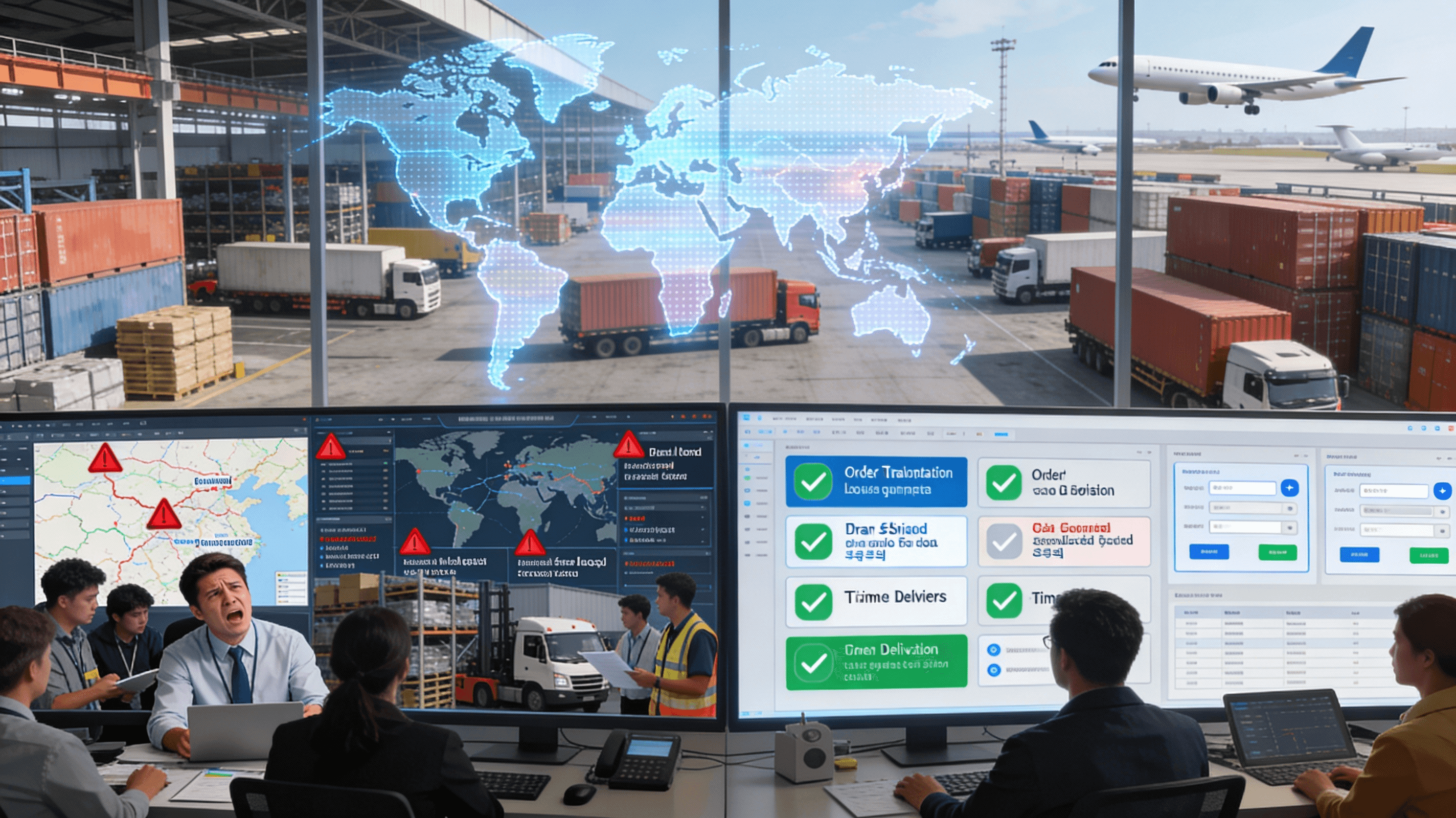How Quantum Computing and AI Will Transform Logistics
Wednesday, 8 Oct 2025
|
What is the Potential Impact of Quantum Computing Combined with AI on Logistics?
The logistics industry stands on the brink of a profound transformation, driven by technological advancements like Artificial Intelligence (AI) and Quantum Computing. While AI has already begun reshaping how logistics companies optimize routes, manage supply chains, and enhance customer experiences, quantum computing is poised to supercharge these capabilities by solving complex problems that were once deemed insurmountable.
For logistics executives—CEOs, CXOs, and COOs—the potential synergy between quantum computing and AI presents both an exciting opportunity and a challenge. How can these groundbreaking technologies be leveraged to streamline operations, reduce costs, and improve decision-making? What does this mean for the future of logistics? In this article, we’ll explore the transformative impact of quantum computing combined with AI on logistics and how it will shape the industry in the coming years.
What is Quantum Computing? A Brief Overview for Logistics Executives
Before diving into its impact on logistics, let’s briefly define quantum computing. Quantum computing uses principles of quantum mechanics to perform calculations that are vastly more complex and faster than those possible with traditional computing. While classical computers use bits (representing a 0 or 1), quantum computers use quantum bits, or qubits, which can represent multiple states simultaneously, enabling them to process enormous amounts of data and solve problems exponentially faster.
Quantum computing has the potential to revolutionize industries by addressing problems related to optimization, simulation, and data analysis that classical computers struggle with. For logistics, this could mean a game-changing leap forward in areas like supply chain management, route optimization, and predictive analytics.
How AI and Quantum Computing Will Enhance Logistics Operations
AI and quantum computing, when combined, have the potential to address many of the challenges that currently hinder logistics operations. Here's how:
1. Enhanced Optimization of Supply Chains
One of the most significant benefits of quantum computing is its ability to handle complex optimization problems. Supply chain optimization involves making decisions on inventory management, supplier selection, and distribution routes, often across vast and dynamic networks. Traditional methods can be slow, especially when the number of variables increases.
Quantum computing's power lies in its ability to explore a vast number of solutions simultaneously, making it far superior to classical computers at solving optimization problems. When integrated with AI, this capability allows logistics companies to make real-time decisions about inventory, demand forecasting, and production scheduling that are far more accurate and efficient.
Business Implications:
- Improved Inventory Management: AI can predict demand, while quantum computing helps optimize stock levels by evaluating complex trade-offs between supply and demand in real-time.
- Smarter Supplier Relationships: Logistics companies can use quantum-powered AI to identify optimal supplier networks and shipping methods, driving down procurement costs and improving service delivery.
- Cost Savings: By accurately forecasting demand and optimizing routes, companies can reduce costs related to excess inventory, late deliveries, and inefficient routes.
Real-World Example:
Volkswagen is already exploring the use of quantum computing to optimize traffic flow for delivery vehicles and predict the best routes for its logistics network. With AI and quantum computing, Volkswagen could significantly reduce delivery time and fuel consumption.
2. Quantum-Enhanced Route Optimization and Scheduling
In logistics, one of the most challenging tasks is route planning. The traditional approach involves running algorithms to find the shortest or most cost-effective routes. However, the complexity increases when factoring in variables like weather, traffic, road closures, and delays, especially in large networks with thousands of delivery points.
With AI and quantum computing, logistics companies can optimize routes not just based on current data but also by simulating multiple future scenarios, such as disruptions or changes in demand. Quantum computing’s ability to process vast amounts of data means that AI can consider and adapt to multiple factors in real-time, resulting in faster, more efficient route planning.
Business Implications:
- Faster Delivery Times: AI can reduce decision-making time, while quantum computing can identify the most optimal routes and schedules, reducing the overall time spent on deliveries.
- Lower Fuel Costs: By finding the most efficient routes, logistics companies can reduce fuel consumption, leading to both cost savings and environmental benefits.
- Adaptive Scheduling: AI and quantum computing will enable dynamic scheduling that adjusts in real-time to factors like weather and customer needs.
Real-World Example:
DHL has been experimenting with AI to improve its route optimization, and with the addition of quantum computing, the company could further enhance its ability to reduce delivery times, fuel usage, and operational costs.
3. Improving Predictive Analytics for Demand and Maintenance
AI is already widely used for predictive analytics, helping logistics companies anticipate demand and schedule maintenance proactively. However, the complexity of supply chains and the volume of data make accurate predictions challenging. Quantum computing’s ability to process vast quantities of data in parallel offers a massive leap forward in this area.
With quantum-powered AI, predictive models will become even more accurate, enabling logistics companies to forecast demand fluctuations, identify maintenance needs, and mitigate risks associated with disruptions like machine failures or supply shortages. By analyzing multiple variables and running scenarios simultaneously, quantum computing can provide real-time insights into how best to prepare for potential issues.
Business Implications:
- Proactive Maintenance: Quantum-enhanced AI will allow companies to predict when equipment is likely to fail, reducing costly downtime and increasing fleet uptime.
- Accurate Demand Forecasting: AI can accurately predict demand spikes, ensuring companies are prepared to meet customer expectations without overstocking.
- Reduced Operational Risks: AI and quantum computing can help logistics companies anticipate disruptions, allowing them to take preventive actions before issues escalate.
Real-World Example:
UPS is leveraging predictive analytics with AI to optimize delivery routes and maintenance schedules. With quantum computing, UPS could further refine its models, reducing costs and improving service reliability.
4. Speeding Up Data Processing and Decision-Making
Logistics companies generate vast amounts of data, from customer orders and inventory levels to traffic conditions and weather patterns. While AI is already helping companies analyze this data to make informed decisions, quantum computing can accelerate this process, making it even more efficient.
AI-powered quantum computing enables companies to process and analyze data at a much faster rate, providing decision-makers with real-time insights and allowing them to respond more quickly to changes in the logistics environment.
Business Implications:
- Real-Time Decision-Making: Quantum computing’s speed enables AI systems to provide real-time analytics, helping logistics executives make quicker, more informed decisions.
- Increased Operational Agility: Companies can adjust quickly to market fluctuations, disruptions, or changes in customer demand, maintaining a competitive edge.
- Improved Efficiency: Faster data processing means logistics companies can streamline operations, making them more efficient and reducing bottlenecks.
Real-World Example:
Maersk, the global shipping giant, uses AI for real-time analytics. Incorporating quantum computing could further boost the company’s ability to make rapid, data-driven decisions on shipping routes, inventory management, and fleet utilization.
Challenges and Considerations for Quantum Computing in Logistics
While the potential benefits of combining AI with quantum computing in logistics are enormous, there are several challenges that need to be addressed:
- Infrastructure Development: Quantum computing is still in the early stages, and significant investments in infrastructure and research will be necessary to make it accessible for logistics applications.
- Skill Gaps: Quantum computing requires specialized knowledge, so logistics companies will need to invest in talent or collaborate with quantum computing experts to leverage the technology effectively.
- Regulatory and Ethical Concerns: As with any new technology, quantum computing comes with legal and ethical challenges, particularly around data privacy and security.
Conclusion: Embracing the Future of Logistics with Quantum Computing and AI
The combination of AI and quantum computing has the potential to revolutionize logistics by solving complex problems more efficiently than ever before. From optimizing supply chains and routes to improving predictive analytics and decision-making, these technologies will empower logistics companies to operate more cost-effectively, reduce risks, and enhance customer satisfaction.
For executives in the logistics industry, now is the time to start preparing for this quantum leap. By understanding the potential of quantum computing and AI, companies can begin laying the groundwork for future success, ensuring they remain at the forefront of an evolving industry.
Next Steps: Book a Demo with Debales AI!
Want to learn more about how AI and quantum computing can transform your logistics operations? Book a demo with Debales AI today and see how our AI-powered solutions can help you stay ahead in the logistics revolution.
Suggested Posts:
For further insights into the future of AI and logistics, check out these articles:


